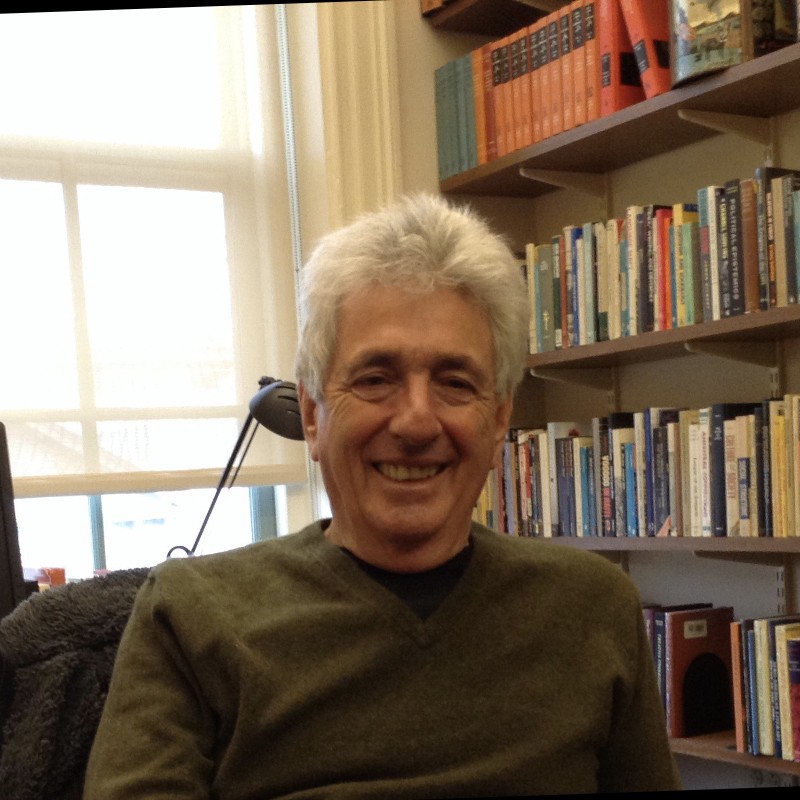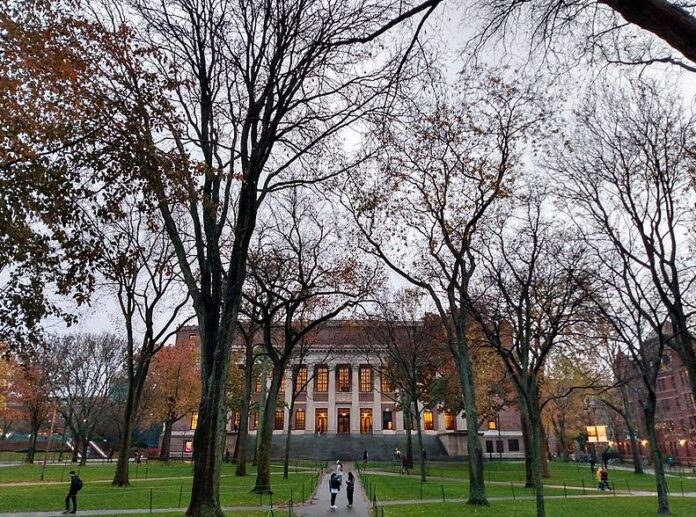CONTENT WARNING: This article contains mentions of verbal and physical sexual harassment and violence.
Three graduate students at Harvard, including an Indian American woman, have sued an anthropology professor over extended sexual abuse, the American Bazaar reports. The lawsuit has sharply divided Harvard faculty, and triggered a nationwide reckoning about sexual harassment in graduate programs across the country.



The lawsuit’s plaintiffs—Indian American graduate student Amulya Mandava, Margaret Czerwienski, and Lilia Kilburn (pictured left to right)—are all decorated anthology Ph.D. candidates overseen by Professor John Comaroff, the Hugh K. Foster Professor of African and African-American Studies at Harvard.
Comaroff’s alleged misconduct has been public since at least 2020, when a Harvard Crimson article reported that Comaroff, along with two other professors, were facing Title IX investigations. However, Czerwienski, Kilburn, and Mandava’s new complaint has brought renewed national focus to their case, as well as thoroughly detailing the extent of the accusations.
Per the legal complaint, Comaroff’s abuse of Mandava began over a decade ago. In 2009, Mandava pursued a B.A. in anthropology from the University of Chicago, where Comaroff taught prior to his Harvard position. In an interview with the New York Times, Mandava claims that Comaroff “showered [her] with unwanted attention,” including comments about her clothing’s neckline. Mandava described his statements as “objectifying and boundary-crossing.”
In another instance, Mandava was forced to travel alone with Comaroff during a study abroad trip in South Africa, sitting next to him during long drives as he made more inappropriate comments about her clothing. Feeling uncomfortable, Mandava told another professor, David Bunn, about Comaroff’s behavior, hoping for an intervention. Bunn, however, informed Mandava that Comaroff regularly developed an “obsessive” focus and “crush” on female students during trips, and did not take action.
The lawsuit alleges that Mandava was not alone, as numerous students at both Chicago and Harvard were subjected to verbal and physical sexual harassment. The students say these included sexual jokes, nonconsensual touching, kissing, groping, and threats of retaliation that dissuaded students from reporting his behavior. Kilburn accused the professor of physical abuse even before she was formally enrolled at Harvard, as she said Comaroff kissed her on the mouth without her consent during a campus visit and frequently made physical advances, to the point where her academic career was severely impeded.
The lawsuit further alleges that Mandava was aware of Comaroff’s history, and personally knew multiple students who had been harassed by Comaroff. As a result, she began warning students away from Comaroff in 2017 and reported Comaroff’s behavior to Harvard administration and Professor Ajantha Subramian, neither of which took action. However, the complaint alleges that Mandava faced retaliation for her actions. During a private meeting about a grant application in his office, Comaroff threatened her if she continued to, per his wording, spread “nasty rumors” about his sexual misconduct, informing her that other students in the past who perpetuated those rumors had “trouble getting jobs.”

Per the complaint, an external factfinder hired by Harvard’s Faculty of Arts and Sciences (FAS) investigated Harvard’s Office for Dispute Resolution (ODR), and confirmed that Comaroff’s behavior violated the FAS’s Professional Conduct policy. It further affirmed that Comaroff had retaliated against Mandava for reporting.
“Through its deliberate indifference, Harvard has denied all three Plaintiffs their rights to work and learn in an environment free of gender discrimination and associated retaliation,” the complaint states. “Plaintiffs have suffered and will continue to suffer harm, including loss of future educational and employment opportunities, humiliation, embarrassment, reputational harm, emotional and physical distress, mental anguish, and other economic and non-economic damages.”
According to the New York Times, Comaroff has, through his legal team, “categorically denie[d]” that he had harassed or retaliated students, including the extensive harassment Kilburn faced. The Times further reports that Harvard has found Comaroff responsible for verbal misconduct, but not unwanted sexual contact.
The lawsuit, however, questions Harvard’s investigation, alleging that the institution had failed to act on multiple occasions, discouraged plaintiffs from reporting abuse through formal channels, and, once formal complaints were made, gave Comaroff copies of them that allowed him to both retaliate and pressure students into deleting evidence. Per the lawsuit, Harvard also obtained medical notes from Kilburn’s psychotherapy sessions without her consent, disclosed them to Comaroff, and publicized them in their final investigative report.
Though many had heard about the accusations against Comaroff due to the previous Crimson article, the complaint sent shockwaves through academic circles.
At Harvard, controversy raged within a divided faculty. Following news that Comaroff had been placed on unpaid administrative leave on January 21st, the Chronicle of Higher Education reported that 38 faculty members had signed a letter in defense of him, affirming that Comaroff was “an excellent colleague, advisor and committed university citizen” and defending his role as adviser. The letter was immediately met with backlash. A subsequent response letter published in the Harvard Crimson that defended the Title IX investigations was signed by 73 faculty members. Later, the New York Times reported that most of the original 38 signatories had issued a retraction of their original letter.
For other scholars across the country—many who identified as female—the case was a painful reminder of the systemic issue of abuse that had affected them personally.
Similar reports of sexual misconduct committed by professors in higher education have occurred at numerous universities, including Columbia University, Boston University, Arizona State University, USC, Stanford, and UC Berkeley. Data is sparse on the true extent of faculty misconduct. However, a paper by Sara L. Young and Kimberly K. Wiley published in Journal of Public Affairs Education noted that sexual harassment in academia was second only to the military; furthermore, 24% of “sexual harassment incidents” experienced by women, and 18.2% from men, were committed by faculty members. WGBH further reported that a 2015 survey of some 500 graduate students found that nearly 40% of the female students reported sexual or gender-based harassment by faculty and staff.
Like the Harvard complaint, offenders in many of those cases are lightly punished, if at all, while their students suffer severe setbacks in their careers. As psychologist and Stanford University visiting scholar Jennifer Freyd explained to WGBH, this is often due to the hierarchical nature of academia. The insular nature of many departments forces students to rely on a small group of faculty members for recommendations, research opportunities, guidance, and more.
“Those relationships tend to be marked by very, very strong power asymmetries, where the graduate students can be dependent on the faculty member for their funding in many cases, for their letters of recommendation, for their ability to stay in the program,” Freyd told WGBH.
Korean American professor Seo-Young Chu, who teaches English at Queens College in New York, came forward against an abuser while she was a student at Stanford. She tweeted that reading the complaint made her “livid,” particularly the allegation that Harvard had disclosed Kilburn’s mental health information without her consent.
“During the investigation that resulted in my tenured rapist being suspended for two years without pay, some Stanford professors tried to weaponize my mental illness against me,” she tweeted. “So this Harvard case is activating in me a lot of deep fury.”
In an article titled “Notes from a Grad School Survivor,” Kellen Heniford wrote that the Harvard case reminded her of her difficult experience at Columbia University, where she also experienced sexual misconduct from faculty members.
“[T]he Comaroff case has forced me to remember what it was like to share a department with a man who drugged and attacked me, what it was like to fight the department tooth and nail just for recognition of a single demand—for our safety—and not even achieve that,” she wrote in her post.
“It has been a difficult week,” she concluded.
Ultimately, Mandava, Kilburn, and Czerwienski hope to force lasting changes in the investigation of misconduct at Harvard. Caroline Guentert, a lawyer representing the three plaintiffs, told GBH that the major goal of the lawsuit was to prevent any future students from experiencing the same difficulties as the students had.
“[W]hat we really hope here is that students don’t need to go through a process that was as biased and burdensome as our clients had to experience,” she said. “And certainly that they won’t be met with faculty opposition once they step up and have the courage to speak out about this.”
Amulya Mandava photo via Twitter
Margaret Czerwienski photo via Twitter
Lilia Kilburn photo via LinkedIn
AsAmNews has Asian America in its heart. We’re an all-volunteer effort of dedicated staff and interns. Check out our new Instagram account. Go to our Twitter feed and Facebook page for more content. Please consider interning, joining our staff, or submitting a story, or making a contribution.

